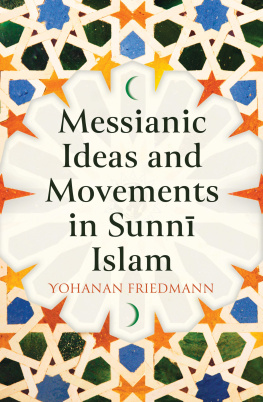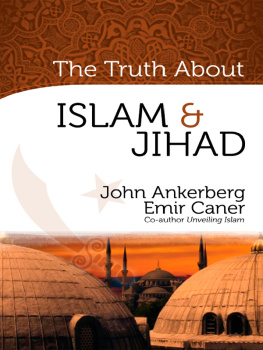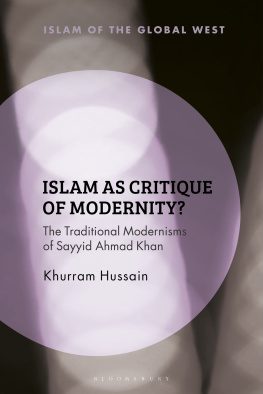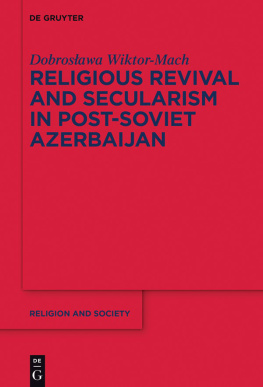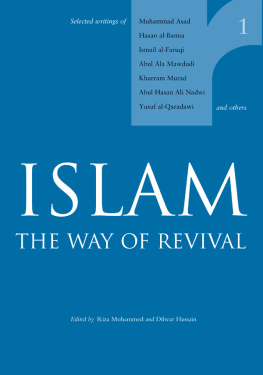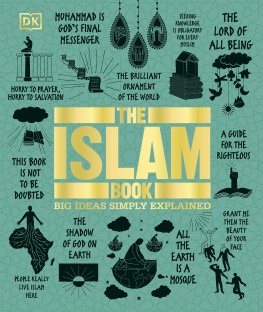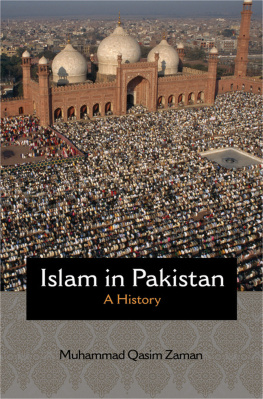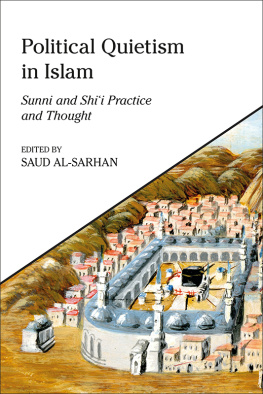Preface
Expectation of a redeemer is a widespread phenomenon in many civilizations. The hidden, innermost thoughts and aspirations of a civilization can be gauged from its description of its forthcoming redeemer, of its messianic age. Like adherents of other civilizations, Muslims have also cultivated the hope that at some time in the future a redeemer will appear and transform the nature of human existence for the better. Classical Islamic traditions maintain that this redeemer will establish justice where injustice and oppression prevailed, will destroy Judaism and Christianity, transform Islam into the sole religion, bring about religious uniformity in the world and cause Islam to reign supreme. He will attain this goal in collaboration with Jesus who will return to this world as a Muslim and play a central role in this apocalyptic endeavour.
Contrary to current scholarly ethos which values comparative studies, this work will not attempt to compare the Muslim mahd movements and their ideas with messianic movements in other faiths. The amount of material on Muslim movements which needs to be surveyed, analysed and interpreted is enormous and even this material could not be used in its entirety in the preparation of the present work. I have therefore preferred to concentrate on the main purpose of the book rather than engage in comparisons with other civilizations. There will of course be a comparison of the Sunn Muslim mahd s with each other. This is the focus of the last chapter of the book.
In choosing to include some of these Sunn mahd claimants in my analysis, I am not passing judgment on the sincerity or otherwise of that persons messianic claim. Anyone who advanced a claim to be a mahd , convinced a substantial number of people to accept it and left behind documentation which enables us to study his thought may be a mahd for the purposes of this study. One thinker whose thought I have analysed does not fit this definition: Ab al-Al Mawdd (d. 1979) developed a theory relevant to the mahd phenomenon, but as far as I know was not a messianic claimant himself. I also need to say that as a matter of principle I do not speak of mahd s and pseudo- mahd s. No messianic claimant so far has been able to deliver on his promises and therefore all claimants are pseudo- mahd s in a significant sense.
There have been numerous mahd claimants in the Sunn branch of Islam and it is not possible to discuss all of them within the framework of this work. For the purpose of the present book, I have chosen to deal with four messianic claimants from different periods and different regions. The North African Ibn Tmart (d. 1130) and the Indian Muslim Sayyid Muammad Jawnpr (d. 1505) operated in medieval times and under Muslim rule. In the endeavour of the Sudanese mahd Muammad Amad (d. 1885), anti-British struggle was paramount and intimately related to his religious thought. The messianic claim of Mrz Ghulm Amad (d. 1907) and the controversy concerning the nature of the mahd in modern Muslim India transpired under British rule and included extensive polemics against Christianity and the Christian missionaries in India, but in the main did not entail anti-British activity. The substantial differences between these mahd s are a good example of the interpretative possibilities available to Muslim thinkers and religious leaders who want to use classical Muslim thought and tradition, and reinterpret them in a manner appropriate for their time and place.
Since the idea of the mahd in the Sha branch of Islam has been subject of extensive research, the focus of this book is the messianic idea in the Sunn branch, which has received much less attention. The various chapters will touch upon the political history of the Sunn mahd movements only to the extent that this is essential for the understanding of their religious thought. The mahd s who had political significance, such as Ibn Tmart and the Sudanese mahd Muammad Amad, have been frequently studied with their political and social perspectives in mind. Their religious thought, on the other hand, has received less attention. This will be the principal concern of this book. Wherever possible, there will be an attempt to relate the mahd s thought to classical Muslim ideas on the apocalypse. In order to make this feasible, the first chapter of the book will survey and analyse the main elements of classical Muslim thinking on the appearance of the mahd and the related apocalyptic drama.
The mahd idea is usually associated with Sh Islam and there is an enormous amount of research on the Sh view of apocalyptic redemption. The centrality of the mahd idea in Sh thought both medieval and modern is beyond question. Its contemporary centrality can be gauged from the fact that article 5 of the Iranian constitution of 1979 implies that the government of the just and God-fearing jurisprudent ( faqh-i dil o muttaq ) meaning the present government of Iran will last only until the manifestation of the mahd . It is also reflected by the existence of dedicated institutions in Iran and Iraq which produce a constant stream of books on the mahd and his importance. Some scholars dedicate their books to the mahd and even ask him to accept their works. It is, however, noteworthy that according to many Sh scholars, the mahd idea is not specifically Sh: it belongs to Islam in general. Numerous books by Sh scholars have been written in recent years in order to advance the notion that the mahd idea is common to both major branches of Islam. Some writers even consider it as a possible tool for rapprochement between the Sunna and the Sha.
The perception of the mahd idea as primarily a Sh one is among the reasons that pertinent Sunn ideas and the numerous Sunn claimants have received much less attention. This imbalance needs to be redressed. Goldziher and Friedlnder before him asserted that in Sunn Islam the pious awaiting of the mahd never took the fixed form of dogma. but this should not be understood to mean that the idea has little importance in Sunn Islam. While some Sunn scholars took pains to undermine the mahd traditions and even considered them unreliable, numerous Sunns made messianic claims throughout Islamic history. None of them commanded universal acceptance, but the mahd s made considerable impact in the regions where they emerged. In two major cases Ibn Tmart and Muammad Amad they managed to establish political units. The Almohad empire lasted for about 140 years; the state established by the Sudanese mahd lasted for eighteen years only, but during these periods both movements produced Muslim regimes which are highly significant for the evaluation of radical Muslim movements and their objectives in modern times.
The apocalyptic drama also has modern relevance. A large number of contemporary Muslim writers have interpreted various details of the apocalyptic drama as relating to modern personalities and situations. Both Sunn and Sh writers have interpreted events and personalities in the apocalyptic drama as relating to contemporary events. The evil participants in that drama mainly the dajjl are identified with oppressive rulers in modern times, as well as with communism, capitalism, materialism, Zionism and the United States of America. Perhaps the most bizarre attempt at actualization of the apocalyptic drama was the Nazi idea to identify the coming of Hitler with the second coming of Jesus and to identify the false messiah ( dajj l ) with a monstrous Jewish king, to be killed by the new incarnation of Jesus Adolf Hitler.

